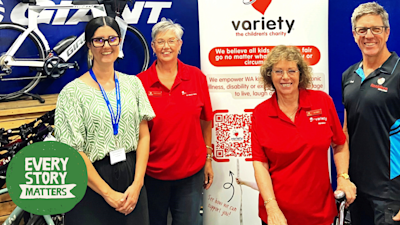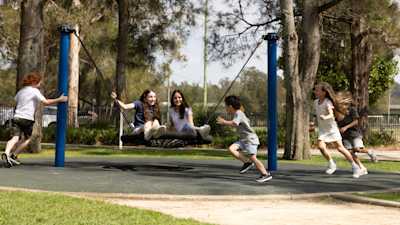Lived experience helps create positive change in out-of-home care.

Image: From the left; Rachael, Tracey, Julie, Holly and Jessica stand together against a purple wall with a white painted tree. A Life Without Barriers banner for Reconciliation is on the left of them.
Members of Child Youth and Family team from Life Without Barriers has come together in Adelaide to film a panel presentation for The Association of Children’s Residential and Community Services Annual conference held in Boston. The presentation is about quality family time, commonly called family contact or visitation.
For the panel, Jessica Cocks, Julie Wood, Tracey Ashton and Rachael Dean, Life Without Barriers staff, spoke with Holly, parent with lived experience of reunification, about family strengthening.
We took the opportunity to sit down with the team, to chat about the work they are doing to make family time better for children and to increase reunification from out-of-home care. By changing family time, we can reshape how families are supported through reunification in the child protection system.
Jessica Cocks, National Manager Research, Design and Innovation, Stride Team, is a passionate advocate for change in the child protection system.
“Stride stands for Strategic Innovation, Design, and Evaluation,” Jessica explains.
“We look after all the evidence-based programs that Life Without Barriers manages in Australia, including the CARE model, MOCKINGBIRD FAMILY™, Multi Systemic Therapy and the Youth Advocacy Program.”
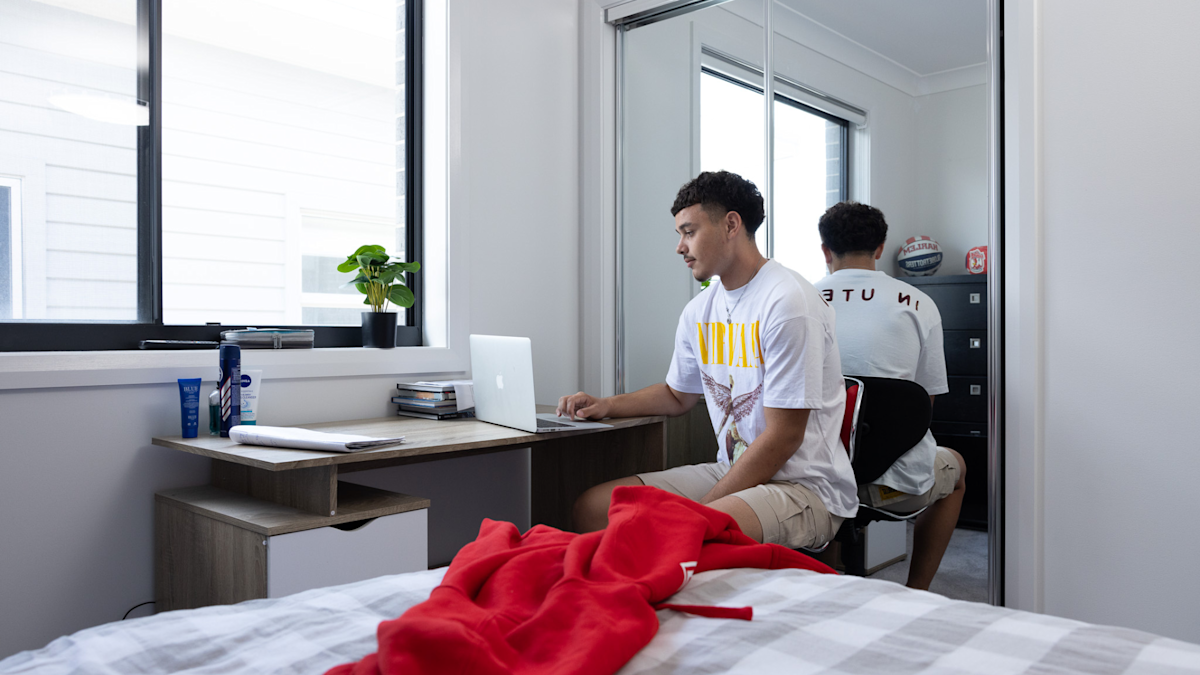
Image: A teenage boy sits at a desk, using a laptop.
Jessica’s work is deeply rooted in improving the lives of children and families involved in the child protection system through family inclusion.
“We’re trying to develop, trial, and evaluate initiatives that mean families participate meaningfully and in an ongoing way in the lives of children,” she said.
Children in out-of-home care too often find themselves disconnected from their families and communities. Through her work, Jessica has championed family inclusion. She and others in Stride works closely with parents, families, and young people to ensure they are leaders in shaping change.
Jessica has witnessed first-hand the progress that has been made, though she acknowledges the system's shortcomings.
“Too many children are being taken into out-of-home care, and too many children are not getting the opportunity to return home to family and community,” she shares.
“I have seen a significant positive change in attitude and practices at Life Without Barriers, with a real recognition that children and young people need their families involved in their lives.”
Her belief in the power of lived experience stands at the heart of her work.
“Parents, families, and young people, they’ve got the solutions,” Jessica said.
And seeing this is what keeps her motivated, as do the success stories of families who have been reunited with their children.
“Several times in the last few years, I’ve seen young families who’ve had extraordinary difficulties, but who’ve managed to get their children back home, overcoming so many odds.”
One of the standout initiatives Jessica has been part of is the Family Time Program, which has reshaped the way reunification works for families involved in the child protection system.
“Family Time is about reframing parents and families to be the leaders of their time spent with their children,” Jessica explains.
“It’s designed to drive participation and ultimately improve reunification outcomes.”
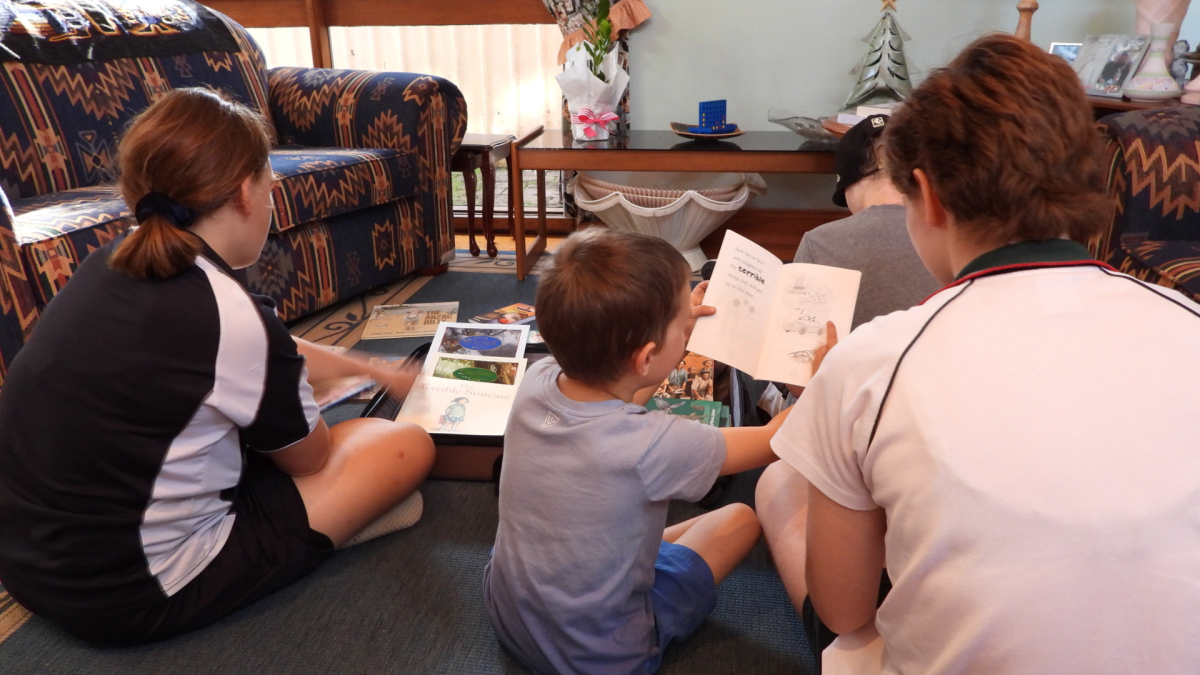
Image: Three children with their backs to the camera reading books.
Julie Wood, Child Family Practitioner, has been with Life Without Barriers for over a decade and works in the reunification team, where her focus is on helping and supporting families.
“Reunification is about working with families to get their children back after they’ve been taken into care,” Julie explains.
“We provide intensive, one-on-one support, building their skills and helping them become confident enough to have their children returned.”
Julie knows the care system very well personally and professionally.
“I was a foster carer over 30 years ago, and the child I cared for is still part of our lives,” Julie shares.
Her experience as a carer has shaped her approach to the families she works with.
“It helps me connect with parents and carers because I truly understand part of how they’re feeling,” she says.
“I can relate, and that makes a difference.”
A highlight for Julie is seeing parents grow in confidence as they prepare to reunite with their children.
“It’s just lovely to see families change. Watching young mums learn how to take care of their babies, build that confidence, and eventually be ready to bring their children home—it’s incredibly rewarding.”
And with Family Time, the process of reunification becomes more structured and purposeful, with practitioners helping families plan and reflect on the visits with their children.

Image: A mother and two children smile at the camera. It is a close-up photo of their faces.
Rachael Dean, Peer Support Worker at Life Without Barriers, also understands the care system personally and professionally. Rachael’s personal experience as a mother who had her children removed by the state and later reunified gives her a unique perspective in her role.
“When I went through the process, I realised how difficult it was for parents to navigate the system,” Rachael reflects.
“That's what got me involved in helping other parents.”
Rachael’s work is rooted in advocacy, helping parents navigate the challenges of the system, while also providing training and co-facilitating sessions on the Family Time Program.
“I think what makes a difference is the genuine understanding that comes from having lived the experience,” she says.
“When families know I’ve been through what they’re going through, it builds rapport. It starts us on the same page.” Rachael said.
Through her advocacy, Rachael has witnessed remarkable transformations in families.
“The work is really rewarding when you see parents grow, when they reunite with their children, and when you see their lives change. It makes everything worthwhile,” she says.
Rachael is particularly proud of a mother she has worked with who, despite facing setbacks, has persevered in her journey to reunite with her child.
“She’s had ups and downs, but she’s never given up. Now, her child is going to be back with her.”

Image: A young girl and boy brushing their teeth and smiling at the mirror in a bathroom.
Tracey Ashton, Senior Project Officer Service Design, Research, Innovation, works to disrupt the traditional child protection processes.
“Stride is all about creating new ways of doing things, improving how we support children and families through evidence-based practices,” Tracey explains.
“No two days are really the same for me,” she said.
“A lot of what I do involves reading research, talking to people, and writing about the best ways to improve services for families. I’m lucky to work in a team where we can co-design new programs with parents, carers, and practitioners, using their lived experience to innovate and disrupt child protection and out-of-home care processes.”
Tracey's commitment to social justice is what drew her to Life Without Barriers, and it's the organisation's focus on working with Aboriginal and Torres Strait Islander families and communities that has kept her motivated.
“One of the things that has surprised me and kept me in this work is Life Without Barriers’ deep commitment to Aboriginal families,” Tracey reflects.
She sees this as a vital part of Life Without Barriers mission to ensure families stay together and children go home to their communities.
Tracey’s passion for this work is evident as she discusses the Family Time Program, which has been gaining recognition both within Australia and internationally.
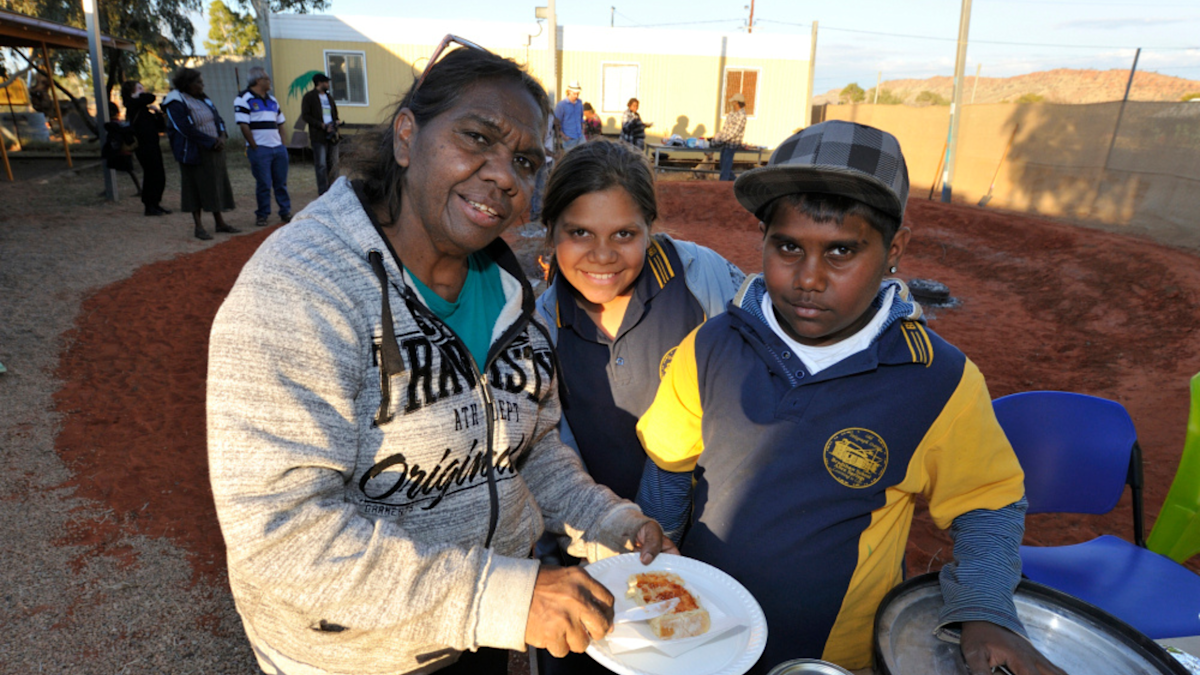
Image: An Aboriginal women is sitting at a playground with her two children. The children are wearing primary school uniforms and the mother is making food.
“Jessica and I are co-leading the co-design of the Family Time Program, and it’s really exciting to see how it’s being embraced by more sites,” Tracey shares.
“We’re even filming a panel presentation about the Program for an international conference in Boston.”
Tracey’s work is central to supporting families and advocating for a better system.
“The focus now is on giving families the tools they need to thrive. It's not only about financial support or practical help; it’s about equipping families with the skills they need to make lasting changes,” she said.
Through the Family Time Program, more families can get the support they need to help rewrite the narrative of the child protection system—one where family leadership, reunification and family connection are at the forefront.
Presentation abstract
Families will do well if they can; if they can’t we need to figure out why, so we can help: strengthening family relationships by redesigning family time when children are in out-of-home care.
Research shows that families and children want and need to spend fun, relaxed, and natural time together to maintain and strengthen their relationships and that they find conventional supervision difficult. Family and child participation in child protection processes, including family time, is also linked to better outcomes in the research literature. Frequent and high-quality family time is linked to reunification. However, day-to-day practice often delivers surveillance-oriented family time processes lacking in participation opportunities, which may not feel safe, may be infrequent and rigid, and may not aid reunification.
